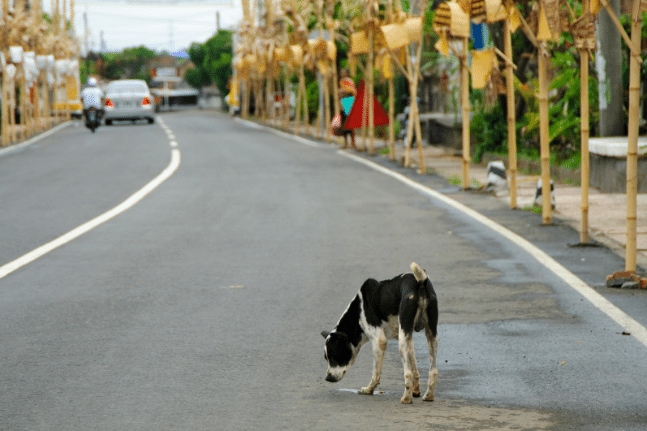Discover changing Bali
Bali has a long history of strong women. In spirit form, they are represented by goddesses such as Dewa Sri, who watches over the rice paddies, and her daughter, who holds the purse strings. In physical form they are the women I see streaming in and out of construction sites for hours carting broken cement and earth balanced in heavy baskets on their heads. I’m sure men lift a finger sometimes but it is only women I see caring for the children, tending the gardens and placating the spirits with hand-woven offerings five times a day. Despite the seemingly relentless toil, the colourfully dressed women still manage to extend the warmest and widest of smiles whenever I pass by.
Perhaps it is the essence of the feminine underpinning life in Bali that has attracted a disproportionate number of women to its coconut-strewn shores over the past few decades, many in search of healing and rejuvenation. Unsurprisingly, some never left, now calling the tiny tropical island home. As one ex-pat said, “Back in the 70s, Bali was an undiscovered pearl in the Pacific. It just had that X-factor. All I knew was that I could be myself there in a way I couldn’t in my birth country… like I could finally unfurl.”
"The greatest aspect of humanity is not just to believe in yourself but to be of service to something greater than yourself."
While you can definitely find the stereotypical image of the ex-pat “unfurling” feet up with a cocktail in hand, the paid help taking care of the details, many foreign residents are vibrant and active members of their new community.
These four women are part of the community of ex-pats who are passionate about giving back to the country that has so generously adopted them. Their significant contributions to community development, environmental sustainability and the arts are helping Bali negotiate the tricky business of becoming a top global tourist destination and find balance again after the dark days of the terrorist bombings almost a decade ago.
Linda vant Hoff
New Zealand-born Linda vant Hoff discovered the lush central mountains of Bali in the 1980s with her husband Norm. It was their “escape” but gradually their hideout evolved into Sarinbuana Eco Lodge, Bali’s first eco holiday destination, twice winner of the Wild Asia Responsible Tourism Award for best Eco Lodge in South East Asia. Their first goal, protecting the neighbouring tract of tropical rainforest, the largest left in Bali, was achieved by brokering an agreement with local communities not to cut trees or poach birds. While protecting endangered orangutans and threatened birds are all part of a day’a work, it’s working with her rural neighbours where Linda’s passion really shines, her training and education initiatives in the local community setting a standard for true eco development. When I arrive at Sarinbuana she is out cleaning the local school, explaining, “My campaign this year is to fix the school. I want them to be proud of it.”
What are you most passionate about at the moment?
This year I have been focusing on the edible gardens, bringing more food plants in. Just watching them grow is so satisfying. Through a Seacology grant we also have a new pair of critically endangered Bali Starlings for breeding back into the wild, which is so exciting.
What sustains you?
Knowing we are significantly improving the economic status of our community; seeing happy children enjoying our sponsored projects at the school, such as the weekly English, martial arts and football classes. It really is a gift to be able to contribute to this incredibly talented culture.
Do you see the role of women in Bali changing?
As of 2011, women in Bali can now inherit land owned by their parents, previously only passed to male members of the family. This is a very important leap for women, as they can now own land in their own right and not be placed in powerless situations.
What has Bali taught you?
Living in Bali has taught me about social sustainability; about what it means to be a part of a real community. The Balinese are amazing for getting things done. Even when there are personal conflicts, they are able to let it go and think of the larger community.
What do you miss about your birth country?
Remote, desolate coastlines with seals and kelp, and skiing in beautiful powder snow.
What inspires you?
Every day I see something that inspires me. It could be a staff member, a guest’s story, an amazing mountain view, a new bird call or an incredible insect. I don’t think a day goes by when I don’t feel inspired in some way.
For more details, visit baliecolodge.com.
Janet de Neefe
Fondly nicknamed the Queen of Ubud, Janet de Neefe has developed into something of a local celebrity since her move from Melbourne over two decades ago. A chef, writer and painter, founder and director of the internationally recognised Ubud Writers & Readers festival, owner of two restaurants, a guesthouse, an emporium of exotic Indonesian goods, a cooking school and bakery, and mother to four children with husband Ketut, Janet is a woman redefining multi-tasking. Collapsing into a chair among the palms at her Honeymoon Guesthouse, Janet looks at her watch and asks, “It’s almost five, not too early for a wine?” While not your typical grassroots activist, Janet is a passionate supporter of the arts in Indonesia, founding the not-for-profit Mudra Swari Saraswati Foundation that assists and sponsors emerging local artists.
What was the inspiration for the Ubud Writers & Readers Festival?
After the second Bali bombing the island was really suffering with the downturn in tourism and I thought there’s no way we’re going to be ignored. I was in the final stages of my book Fragrant Rice when I came up with the idea of a writers festival with international stars in an amazing location… what could go wrong?
How does the festival support local artists?
We hold an emerging writers festival for local writers before the main festival, giving them a chance to cut their teeth on an international stage. Through the Saraswati Foundation we run workshops in things like story writing and illustrations, and give musicians an opportunity to record. I love showcasing local talent at my bar, Bar Luna. Once you start digging for amazing creative artistic folk you just find a treasure chest.
How important is service?
It is the key. I was trained as a teacher and I’ll never forget what we were taught: that the greatest aspect of humanity is not just to believe in yourself but to be of service to something greater than yourself.
The theme of the 2011 writers festival was cultivating the land within. How do you do this yourself?
With food. I bring people together and feed them and that makes me very happy. I’ve just learnt how to cook a traditional ceremonial goat dish… when I got the spice paste just right it was so exciting. There are so many layers of loving with food; it’s my first passion.
What is the essential ingredient for a good life?
Flexibility. Live and let live; that’s the Balinese philosophy. I used to be a perfectionist but I’ve learnt to let go. Failure is very good for you. My uncle says, “He who doesn’t make mistakes doesn’t make anything.”
For more details, visit ubudwritersfestival.com.
Petra Schneiders
Canadian-born Petra Schneiders describes flying into Bali in 1987 as “for the first time in my life feeling like I was coming home”. Since then she has been a whirlwind for change on the island and instrumental in setting up the Indonesian Development of Education and Permaculture (IDEP) Foundation, which has delivered community programs in education, permaculture, disaster risk reduction and relief throughout some of the most turbulent areas of the world. After many steps and wrong turns, I finally find one of Bali’s most dynamic activists tucked up in a leafy village outside Ubud, running between emails, her children and two international permaculturist guests.
What was the inspiration for setting up IDEP?
It was around the time of the political crisis in 1998 and this lovely dream-like world was crumbling; there was violence and a lot of Westerners were leaving. I couldn’t sit around and let it all happen, so a group of us gathered together and decided that what was most needed was to run permaculture training for non-government organisation (NGO) leaders and provide ongoing support for them to assist their local communities in providing food, shelter, energy and other needs in a sustainable way.
What was it like working on the ground in disaster areas?
We learnt in Aceh what an incredibly powerful tool permaculture is for healing trauma. Imagine you’re sitting in a refugee camp and you’ve just lost 11 members of your family and someone comes along and offers to talk to you about God and food and gardens. We ended up training 5000 people in organic gardening, eco-literacy, seed saving, appropriate technology and animal husbandry. Trauma is paralysis, and digging and planting and learning are so healing.
What’s your current project?
I’m currently involved in building the Taman Petanu Eco Neighborhood, a model for sustainable living and community empowerment that upholds the Balinese philosophy of Tri Hita Karana; balancing harmony between people, nature and God or universal energy. It’s been unbelievably fascinating and cool to work with top Indonesian architects and amazing permaculture people.
How do you sustain yourself?
It’s hard. I’m quite burnt out. My family has suffered a lot and I’ve seen a lot of stuff that has been hard to process. I drink tequila (laughs), I meditate, I spend time with friends and family.
What has recently inspired you?
I finally got to meet a guy I’ve been trying to meet for a long time… A little guy from Sumatra who has personally put together 500 organic farmer field schools that are all self-sustaining through a goat and cow micro-credit system. He was so humble and amazing.
For more details, visit idepfoundation.org.
Janice Girardi
To find Janice, just follow the giant black paw prints to the busy headquarters of the Bali Animal Welfare Association (BAWA) in Ubud. Since her arrival here 30 years ago, American-born Janice has been a woman with a single-pointed focus: to alleviate the suffering of Bali’s street animals. BAWA now employs seven local vets and a host of overseas volunteers and staff to run the ambitious animal-rescue programs that include a 24-hour animal ambulance, a mobile sterilisation clinic, a public education program in animal welfare, a puppy adoption program and street feeding. Janice’s labour of love is reaping rewards for the human community too; a large-scale rabies vaccination program has reduced human rabies deaths by 48 per cent in the past year.
Why did you first move to Bali?
I first visited Bali in 1973 as a traveller on holiday from school. Then, 21 years ago, on one of my visits I rescued a puppy and took it home to the house I was renting. Because of this dog I started spending more time in Bali each year and eventually moved here full-time 17 years ago. Honey, the puppy who lived for 16 years, showed me that if I didn’t do something, no one would. It really just opened my eyes to see the suffering of the animals and I knew I had to do something to help them.
What is the current focus of your work?
We have just finished vaccinating almost 300,000 dogs with rabies vaccines, which was an enormous undertaking. We have also been actively involved in meetings on ways to stop dog fighting and dog cruelty involved with dog-meat restaurants.
How has your vision changed over time?
I understand now that without animal welfare laws and education it’s like a bucket with a hole in the bottom; as much water that we put in, the bucket will never be full. So while my resolve is greater, I am not so starry-eyed, as I now realise how very difficult animal welfare work can be and what it’s going to take to make a sustainable difference.
What sustains you in your work?
Unconditional love from animals, joy from the children who learn about this love and knowing how much my help, our help, is needed.
For more details, visit bawabali.com.








